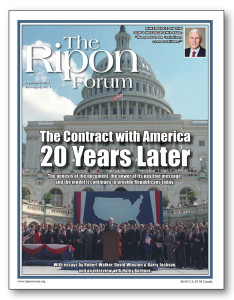Latest edition features essays by Robert Walker, David Winston & Barry Jackson, and an interview with Haley Barbour
 WASHINGTON, DC – With the 20th anniversary of the signing of the Contract with America occurring this coming Saturday, the latest edition of The Ripon Forum marks the occasion by looking at the genesis of the document, the power of its positive message, and the model that it continues to provide Republicans today.
WASHINGTON, DC – With the 20th anniversary of the signing of the Contract with America occurring this coming Saturday, the latest edition of The Ripon Forum marks the occasion by looking at the genesis of the document, the power of its positive message, and the model that it continues to provide Republicans today.
“Twenty years ago this fall,” stated Forum editor Lou Zickar, “367 Republican candidates from all around the country gathered on the West Front steps of the U.S. Capitol and signed the Contract with America. At the time, it was an historic moment because it helped give Republicans control of Congress for the first time in four decades.
“Today, it is a moment worth remembering because it was also a time when the GOP loudly and proudly proclaimed not what they stood against, but what they stood for. We mark the anniversary of the Contract and its signing in this latest edition of The Ripon Forum with a series of essays that look at its impact on the 1994 mid-term elections, and its relevance to the mid-term elections this fall.”
The authors and essays featured in the Forum include:
- Former GOP Deputy Whip Bob Walker, who writes about the genesis of the Contract and how the ideas included in the document were developed in a series of weekly meetings that the Conservative Opportunity Society held in Room 121 of the Cannon Building on Capitol Hill in the 1980s. “Ten years before the Contract was announced,” Walker writes, “COS laid down many of the concepts that found their way into it.” He adds: “We remember the party’s victory that year as being the start of the Republican Revolution. In reality, it’s more than that. It’s an example of what a small band of committed reformers can do when armed with the right ideas.”
- Republican strategist David Winston, who writes about the fact that the Contract took Republicans down a radically different path in their campaigns, one that nationalized their election and presented them with a positive message to embrace. The Contract “offered voters change that could actually happen and would work,” Winston writes. Comparing the GOP’s success that year with other mid-terms since then, Winston adds: “Only one off-year election truly replicated, in fact, exceeded, the Contract’s success by returning to an idea-based, nationalized campaign – the 2010 election for the House embodied by the Pledge to America.”
- Veteran Congressional and Presidential advisor Barry Jackson, who served as Executive Director of the Contract and writes about the model for campaigning – and governance – that it provided then and continues to provide for Republicans today. “Getting back to Contract-like mentality may be key to the revival of our democracy and the future of democratic movements around the world,” Jackson writes. “Today, as we watch nascent democracies struggle to take root, it’s easy to see a common thread. People’s lack of faith in democratic government rises as their elected leaders fail to deliver on the promised policies and reforms which contributed to their election.”
This latest edition of the Forum also includes a Q&A interview with former Governor Haley Barbour, who discusses the effort he led as Chairman of the Republican National Committee to market and develop the Contract and the document’s impact on the election that year. “The Contract with America was very important in 1994,” Barbour states, “not only because of the policies it promoted but because it gave people something to vote for. When asked whether Republicans would be able to agree on a Contract today given the party’s internal divisions over the past few years, Barbour was blunt: “The fractious nature of today’s GOP is mostly about tactics, not policy. The vast majority of Republicans agree on most of these issues.”
To the extent that there are those who disagree with Barbour and argue that Republicans don’t have a positive message to run on this fall and are simply the party of “no,” this edition of the Forum also provides an alternative narrative to that argument by putting forward “A Contract for Today” – that is, a realistic agenda for the GOP to campaign on and govern with that is largely based on votes Republicans have cast and bills they have introduced over the past several years.
One of the issues that will likely be near the top of any Republican agenda is energy. This edition of the Forum looks at the issue in depth with a series of essays by:
- House Energy and Commerce Committee Chairman Fred Upton (MI-6) – writing about “The Red Tape Factory” and how EPA overregulation is driving up the cost of energy;
- ConservAmerica President Rob Sisson – writing about the Republican Party’s rich legacy on conservation and why today’s GOP should embrace it;
- Author and academic Amy Myers Jaffe – writing about America’s energy export policy and why it is rooted in the past instead of suited for the future;
- Market analyst Phil Flynn – writing about the President’s shortsighted policy on coal and its unintended consequences; and,
- Manhattan Institute Fellow Diana Furchtgott-Roth – writing about a recent decision by the New York Court of Appeals that could impact fracking around the U.S.
The latest edition of The Ripon Forum also includes a profile of Indiana Governor Mike Pence, who, among other topics, shares his thoughts on the GOP message this fall. “We need to be ‘solutions conservatives,’” the Hoosier State Chief Executive declares.
Now in its 49th year of publication, The Ripon Forum is published by The Ripon Society. In addition to Zickar, members of the Forum’s editorial board include: former Representatives Bill Frenzel (MN-3), Tom Tauke (IA-2), Mike Castle (DE-AL), and Mike Oxley (OH-4); Billy Pitts, a veteran policy strategist and former Floor Assistant in the U.S. House; Judy Van Rest, the Executive Vice President of the International Republican Institute; Pamela Sederholm, the President of an Alexandria, VA-based government affairs firm; and Jim Murtha, a grassroots strategist based in Philadelphia. Other members of the editorial board include: Jarrad Hensley, the Forum’s Deputy Editor; Stephen Jackson, the Ripon Society’s Policy Director; and Jim Conzelman, the President & CEO of the Ripon Society and a 30-year veteran of Capitol Hill.
The Ripon Society is a public policy organization that was founded in 1962 and takes its name from the town where the Republican Party was born in 1854 – Ripon, Wisconsin. One of the main goals of The Ripon Society is to promote the ideas and principles that have made America great and contributed to the GOP’s success. These ideas include keeping our nation secure, keeping taxes low and having a federal government that is smaller, smarter and more accountable to the people.



